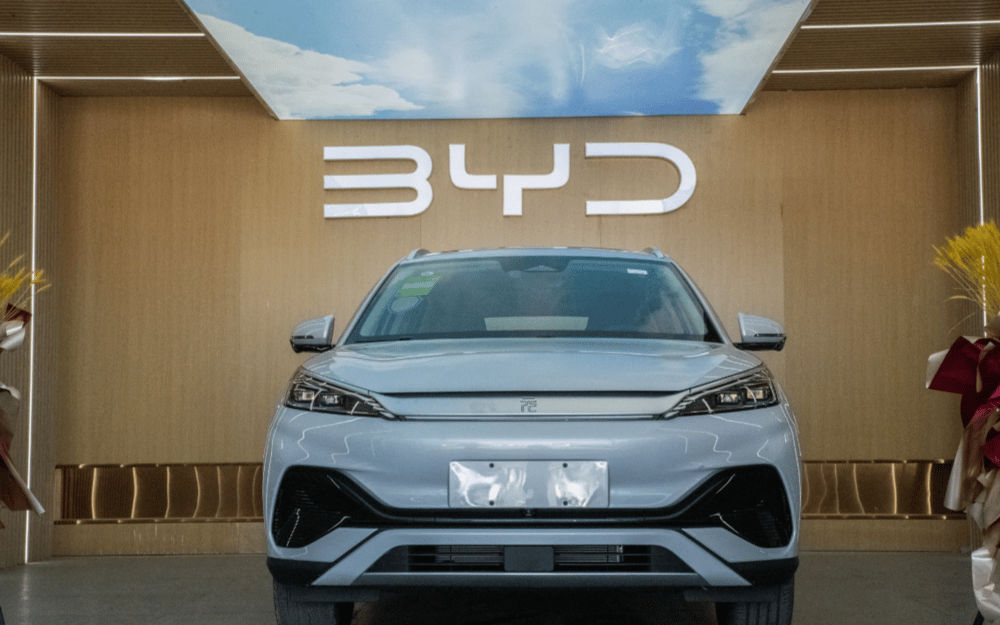Chinese EV Stocks Plunge as BYD Launches New Subsidies Amid Industry Turmoil
China’s electric vehicle (EV) sector faced renewed volatility as shares of major automakers such as BYD $1211.HK , Nio $9866.HK, Geely Auto $0175.HK, and Leapmotor $9863.HK fell sharply. The decline followed BYD’s weekend announcement of aggressive price incentives across over 20 EV models. The move highlights intensifying competition and margin compression in the world’s largest automobile industry, already strained by slowing demand and overcapacity.
The warning by Great Wall Motors’ CEO that the Chinese auto industry is in a “miserable state” added to investor concerns, triggering a broad sell-off across Hong Kong-listed Chinese EV stocks.
Pricing War Escalates as BYD Targets Mass Market
BYD’s new incentive round includes subsidies and pricing cuts that reduced the starting price of its Seagull electric hatchback to RMB 55,800 (approx. USD 7,765), positioning it as one of the most affordable EVs in China. These measures are seen as a direct effort to defend BYD’s market share in the face of slowing domestic demand, rising inventories, and growing competition from Tesla $TSLA, Xiaomi EV, and other domestic brands.
The aggressive pricing strategy could widen BYD’s reach among price-sensitive consumers but risks eroding profitability across the sector. Analysts note that such deep cuts suggest structural imbalances in supply and demand, with production far outpacing real consumer appetite in key segments.
Geely, Nio, and Leapmotor also saw steep declines, reflecting broader investor anxiety over how long smaller or less diversified players can endure in a prolonged price war.

Quick Facts
BYD Stock Performance: -8.6% on Monday
Geely Auto: -9.5% $0175.HK
Nio & Leapmotor: -3% to -8.5%
New EV Subsidies: Applied to 20+ BYD models
Lowest Price EV: Seagull now starts at RMB 55,800 (~USD 7,765)
Industry Mood: Great Wall Motors warns of “miserable” conditions
Market Reaction and Industry Commentary
The Chinese EV sector has been under pressure for months due to slowing demand growth, weaker-than-expected consumer sentiment, and a flood of new models saturating the market. The latest wave of incentives from BYD was perceived by investors as a sign of desperation rather than confidence, prompting broad stock declines.
Market commentators emphasized that while BYD can absorb temporary margin losses due to scale and vertical integration, competitors like Nio and Leapmotor might not sustain similar pricing flexibility. This increases the likelihood of consolidation within China’s EV market, with unprofitable players either exiting or merging.
Additionally, the move adds deflationary pressure to the sector’s recovery, complicating efforts by the Chinese government to stabilize manufacturing output without reigniting unhealthy overproduction.

Key Points
BYD’s Incentives intensify EV pricing competition across China.
Stock Sell-off indicates investor concerns about profitability erosion.
Seagull Pricing Strategy targets mass-market buyers, raising pressure on rivals.
Structural Weakness in demand and oversupply remains unaddressed.
Industry Warning from Great Wall Motors underscores systemic distress.
Market Share vs. Margin in a Saturated EV Landscape
BYD’s latest move to deepen price cuts reflects the escalating tension between market share expansion and financial sustainability within China’s electric vehicle sector. While the strategy may sustain sales volumes in the short term, it threatens to compress margins industry-wide and accelerate shakeout among weaker firms.
As China’s EV sector matures, investors are likely to favor automakers with solid cost structures, technological differentiation, and international exposure. Without a rebalancing of capacity and demand, continued discounting could harm long-term industry health more than it helps short-term competitiveness.















Comments
It highlights how proactive strategies are becoming essential in a tech-driven economy